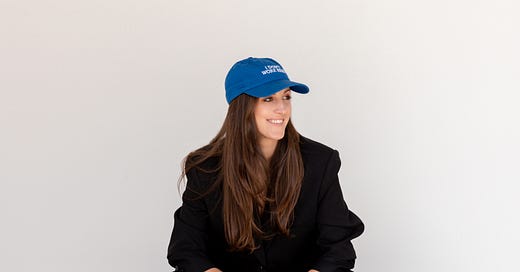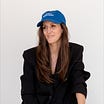Anna Mackenzie | Building A Portfolio Career
The queen of portfolio careers talks about what a portfolio career is, how she built hers, and how to start your own.
I came across Anna’s writing on Substack and quickly became a big fan of hers. Eventually, I emailed her to see if she’d do this interview. Calling in from Melbourne, Australia, here’s Anna!
Your first career goal was to be a spy. Can you talk about how you got from “spy” to “portfolio career”?
My lifelong dream was to become a spy, so when I was at university, I studied business, psychology, international studies, etc. I did a ton of travel, and I was like, “Oh my god! I want to work in diplomacy or intelligence.” So, in my final year of school, I applied to one of Australia’s intelligence agencies. Ten months of interrogations and physical challenges later, I got through to the final round. I bombed out of the interview, didn’t get the job, and couldn’t reapply for seven years.
I was totally lost. I didn’t have a backup plan. Somehow, I managed to land a job at the Japanese retailer Uniqlo. I had no experience in retail, but the role took me to Tokyo and Singapore. I moved overseas and learned everything about how a big business operates, from store to department level, and then I came back to Australia to help launch the brand there. So that was my first foray into big business and launching a global brand in a new market.
Then I ended up at a beauty brand called Mecca, which is basically the Australian version of Sephora. I was leading the Concept Development team. My job was to travel the world and visit all the different Sephoras, Nikes, etc. – all the experiential, innovative places around the world to get inspiration for and build a vision for Mecca’s beauty stores. It was the most amazing job. I was working directly with Mecca's Founder, Jo Horgan, and traveling with her. I was exposed to every single facet of the business. It was my dream job.
After doing that for four years, I caught the entrepreneurial fever. It was the height of the “Girl Boss” movement, and I wanted to do something myself. I started a business with a couple of friends called Lady Brains. It was a community to support female founders. We had a podcast that quickly became one of the biggest business podcasts in the country. Off the back of that success, we hosted in-person events to make money. I ran it for two years before quitting my job six months before COVID to go all in. When COVID started, all of our revenue streams vanished. Brands weren’t sponsoring, and we obviously had to stop doing events. We managed to keep the business afloat during COVID through pivoting and trying so many different things, but when I came out of Melbourne’s lockdown, which was the longest lockdown in the world, I just started questioning everything. I realized I didn’t want to be pouring everything I had into one thing. I left Lady Brains and, a few years later, found myself in this portfolio space, which just feels so right. It feels aligned with what I want to be doing.
Culturally, we celebrate the founder model of going “all in” on something. You’ve spoken before about your resistance to that. Why do you feel that way, and what does a portfolio career mean to you?
I’m not against going all in. I think for some people, going all in is the right strategy for them. But I don’t think you have to go all in to be successful. The portfolio career, to me, is a career made up of many different types of work. It’s kind of continuously amorphous, fluid, and changing. You can scale pieces of it up and down depending on where you’re at in life. You’re not going all in on one thing. You’re actually doing a lot of different things that speak to different interests, skills, or strengths.
My portfolio career is made up of quite a few things. I do startup consulting, I write my Substack (although that doesn’t actually earn me money directly). I mentor people who are building portfolio careers or who want to transition out of the corporate world to build their own things. I also have a digital product called The Portfolio Career Operating System, which helps people build and grow their portfolio careers as if they were startups. Going all in is right for some people, but it’s a very rigid structure. Building a portfolio career allows you to build something unique that speaks to different parts of yourself.
I’m obviously a Substack fan myself. What purpose does Substack serve in your portfolio career if it isn’t a revenue source?
I didn’t have a Substack when I started my portfolio career, but I’d begun writing 30 minutes a day without publishing. I wanted to cultivate a writing habit. I had this intuitive sense that I wanted to write, but I felt I needed to prove to myself that I could sustain the habit before I started a newsletter. I did that for nine months and then I started my Substack.
My Substack wasn’t originally about portfolio careers, but when I wrote a piece about portfolio careers, it popped off. And so, I decided to double down on that topic. It also generated organic inbound interest from people asking: “Hey, can you mentor me?” It drove leads for my startup consulting and coaching. The Substack is not money-generating, but it fuels every part of my portfolio career. Two years into building my portfolio career, 100% of the work I do comes from inbound leads. I also just love Substack. There are so many great people on there, so many great writers. It’s such a nice community. It's my favorite platform.
I struggle with Substack sometimes because I don’t want to pick a niche, but a niche seems so helpful for success. Portfolio careers are all about resisting one niche but in many ways, the topic of a portfolio career is your niche. How do you balance having a niche on Substack with being multi-interested?
When I made the decision to double down on portfolio careers, I thought, "This is almost perfect because it’s the anti-niche niche." While the portfolio career is the umbrella and overarching narrative I frame everything under, I still write about a lot of stuff. I write about startups, personal growth, habits, creativity, being a generalist. The portfolio career is the thread that ties things together. It’s a niche without being a niche.
How do you help those who want a portfolio career but don’t know where to start?
There are three foundational pieces I think people can do while they’re still in a job to set themselves up for a transition to a portfolio career. The first is to have an emergency fund. Particularly if you’re selling services, the sales cycle can be six months long, so having three to six months of expenses is key. The second is cultivating a network of people you can reach out to for work. The third is personal brand building. You don’t need to become a content creator, but having some sort of reputation online and visibility is really important.
The easiest way to transition is to sell the skills you’ve been using in your full-time role, find a client who will pay you to do that in a non-full-time capacity, and then build out from there. It takes time. It’s a process.
You talk about playing on existing skills. A lot of people who will read this are relatively early in their careers. Can it ever be too early to launch a portfolio career?
I’ve been thinking about this a lot recently. I don’t have a perfect answer. I’m kind of speaking aloud here. But in a portfolio career, a decent chunk of your income is coming from services, so you’re selling skills. It’s easier and more lucrative with a deeper skill set.
I worked my entire twenties and built a very deep and well-rounded skill set that I’ve been able to monetize quite lucratively. There’s certainly value in working in workplaces and learning from people. You can lay the foundation for your portfolio career as you work, but the experience you’re having working for others is only going to help you down the track.
Can you tell me about a phrase or idea — maybe from a book, a song, a life motto — that you repeat to yourself often?
I have these mantras that I keep on my Notion. The one I have up there at the moment is “Be the only, not the best.” I don’t know where it’s from. Over the past three to four months, I’ve been dealing with people ripping off my work, particularly my writing. I’ve had random people on the internet impersonating me or copying my work word for word and crediting it as their own. I find it really difficult to see this. The mantra reminds me to tune out the noise, continue pushing myself, refine my craft, and have bigger ideas.
So, where do you go from here?
I will always have a portfolio career. I can never really see myself going back to founder life or working for anyone else. Last year, my focus was on building out all these different income streams and diversifying and broadening my portfolio. This year is all about scaling what I’m currently doing. I found product-market fit very quickly with the digital product I just launched. So this year, for me, is about scaling that product and scaling the impact of my writing. I also want to take on more creative pursuits. I would love to write a book. I have some art projects I’ve been working on. I’d love to build out my portfolio to be more creative, as well as business-like.
I feel like I’m on the right path. I feel like I’m doing the right thing. If I just trust it, it’s going to end up okay.








Loved this chat! Thank you so much for having me ❤️
this was fantastic to read. Anna never ceases to amaze and inspire. so succinct and yet impactful! 🫶